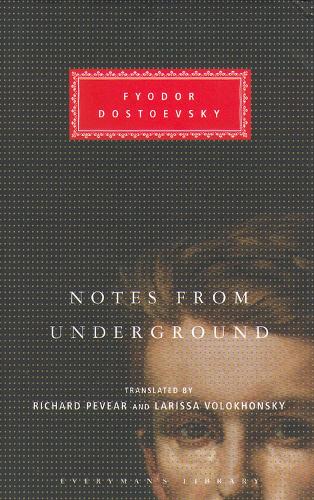
Notes From The Underground
(Hardback)
Available Formats
Paperback
Published: 1st September 2009
Hardback
Published: 1st September 2009
Hardback
Published: 15th March 2004
Publishing Details
Notes From The Underground
By (Author) Fyodor Dostoevsky
Translated by Richard Pevear
Translated by Larissa Volokhonsky
Introduction by Richard Pevear
Everyman
Everyman's Library
15th March 2004
4th March 2004
United Kingdom
Classifications
Physical Properties
Hardback
160
Width 132mm, Height 211mm, Spine 15mm
285g
Description
'I am a sick man...I am a wicked man.' With this sentence Dostoevsky began a work which marks the frontier not only between nineteenth- and twentieth-century fiction, but between two centuries' visions of the self. For the unnamed narrator of Notes From Underground is a multiplicity of selves, each at war with the others - all at war with everything else. A former official who has retreated from society into an underground existence, he scrawls a passionate, obsessive and self-contradictory narrative which serves as a devastating attack on social utopianism and an assertion of man's essentially irrational nature. Richard and Larissa Volokhonsky, whose Dostoevsky translations have become the standard versions, give us a remarkably faithful edition of Dostoevsky's classic which conveys both the tragedy and the tormented comedy of the original Russian.
Author Bio
Fyodor Dostoevsky was born in Moscow on 11th November 1821. He had six siblings and his mother died in 1837 and his father in 1839. He graduated from the St Petersburg Academy of Military Engineering in 1846 but decided to change careers and become a writer. His first book, Poor Folk, did very well but on 23rd April 1849 he was arrested for subversion and sentenced to death. After a mock-execution his sentence was commuted to hard labour in Siberia where he developed epilepsy.He was released in 1854. His 1860 book, The House of the Dead was based on these experiences. In 1857 he married Maria Dmitrievna Isaeva. After his release he adopted more conservative and traditional values and rejected his previous socialist position. In the following years he spent a lot of time abroad, struggled with an addiction to gambling and fell deeply in debt. His wife died in 1864 and he married Anna Grigoryeva Snitkina. In the following years he published his most enduring and successful books, includingCrime and Punishment (1865). He died on 9th February 1881.
